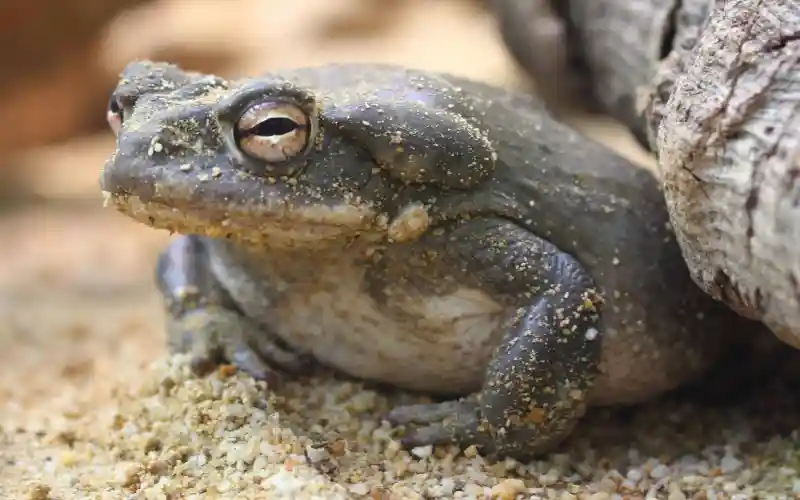Business
Psychedelic Toads Invade Arizona After Monsoon Season Kicks In

The Sonoran Desert Toad is breeding in Arizona after the monsoon rains.
The Sonoran Desert Toad, with glands secreting a venom rich in the hallucinogens 5-MeO-DMT and bufotenin, is invading Arizona now that monsoon conditions have kicked in for the late summer. They can measure up to 7 inches long and have a low-pitched croak that inevitably serenades the night in multiple states during hot wetter months.
Local news stations are reporting a surge in Sonoran Desert Toad populations now that the rain has started. Reporters focused on the poison danger to pets, and well as the temptation for teens to try it for its psychedelic properties.
“Also known as the Sonoran Desert Toad, this amphibian has a pretty mighty punch,” KOLD 13 News correspondent Andres Rendon said. “What the toad does is that it actually secretes a very strong psychedelic compound, and although very dangerous for animals like dogs and cats, using it for a drug in humans is very much illegal.”
5-MeO-DMT is a naturally-occurring hallucinogen found in many plant species and in toads. Used across South America for hundreds of years as an entheogen, it’s now being explored in the medical sphere for treatment-resistant depression, anxiety, and post-traumatic stress disorder (PTSD).
The Arizona monsoon season runs from June 15 to Sept. 15 every year, the Arizona Republic reports, but conditions kicked in a bit later following an abnormally hot year. This year, the state is facing a particularly hot year with record-breaking heat. Additionally, last year’s monsoon season brought record-breaking rain to Arizona and tied for the seventh wettest July-September period on record, according to data from the National Weather Service.
“The monsoon rain brings in the perfect conditions for breeding for the Sonoran Desert Toad in the summer months, and now that monsoon is in full swing. You’ll be hearing more of the croaking often.”
Sonoran Desert toads are most active for the mating season from late May to September, thriving especially when the weather is hot and rainy. Once the monsoon seasons are over, the toads burrow back into the ground after mating. They can be found in Mexico and in parts of Arizona, California, Colorado, and New Mexico.
How Toad Venom Works
“Please refrain from licking [the toads],” the National Park Service warned last November. Toad licking has become so popular that they are considered “threatened” by the New Mexico Department of Game & Fish and they are considered endangered in California.
The recreational and medical use of the toads are catching on. Vice Media’s Hamilton Morris documented the Sonoran Desert toad in detail—calling the toads’ secretion the “most potent psychedelic toad venom on Earth,” which also makes it ideal for medical research. Sonoran Desert Toad venom should only be vaped or smoked, InStyle reported. Toad venom is scraped from the glands on the animals and dried into a paste, which is later smoked. “The experience is going to start within 10 to 30 seconds and then you’re going to be physically incapacitated for 20 to 30 minutes,” Alan Davis, a Johns Hopkins psychedelics researcher, previously explained in Johns Hopkins Magazine.
Mike Tyson discussed smoking toad venom on Hotboxin’ With Mike Tyson. Interestingly, his show includes an animated depiction of toad hallucinations.
It’s also being explored for its medical properties in the field of medicine. Oxford-based startup Beckley Psytech in the United Kingdom announced August 15, 2021 that it raised $80 million to ramp up clinical trials and research using a pharmaceutical formulation of 5-MeO-DMT.
Clinical studies using psychedelics show huge potential to battle treatment-resistant depression, under the guidance of a therapist. But while a psilocybin experience can last five to eight hours, a 5-MeO-DMT session will last just one hour, which could radically reduce the cost of treatment.
Source: https://hightimes.com/news/psychedelic-toads-invade-arizona-after-monsoon-season-kicks-in/
Business
New Mexico cannabis operator fined, loses license for alleged BioTrack fraud

New Mexico regulators fined a cannabis operator nearly $300,000 and revoked its license after the company allegedly created fake reports in the state’s traceability software.
The New Mexico Cannabis Control Division (CCD) accused marijuana manufacturer and retailer Golden Roots of 11 violations, according to Albuquerque Business First.
Golden Roots operates the The Cannabis Revolution Dispensary.
The majority of the violations are related to the Albuquerque company’s improper use of BioTrack, which has been New Mexico’s track-and-trace vendor since 2015.
The CCD alleges Golden Roots reported marijuana production only two months after it had received its vertically integrated license, according to Albuquerque Business First.
Because cannabis takes longer than two months to be cultivated, the CCD was suspicious of the report.
After inspecting the company’s premises, the CCD alleged Golden Roots reported cultivation, transportation and sales in BioTrack but wasn’t able to provide officers who inspected the site evidence that the operator was cultivating cannabis.
In April, the CCD revoked Golden Roots’ license and issued a $10,000 fine, according to the news outlet.
The company requested a hearing, which the regulator scheduled for Sept. 1.
At the hearing, the CCD testified that the company’s dried-cannabis weights in BioTrack were suspicious because they didn’t seem to accurately reflect how much weight marijuana loses as it dries.
Company employees also poorly accounted for why they were making adjustments in the system of up to 24 pounds of cannabis, making comments such as “bad” or “mistake” in the software, Albuquerque Business First reported.
Golden Roots was fined $298,972.05 – the amount regulators allege the company made selling products that weren’t properly accounted for in BioTrack.
The CCD has been cracking down on cannabis operators accused of selling products procured from out-of-state or not grown legally:
- Regulators alleged in August that Albuquerque dispensary Sawmill Sweet Leaf sold out-of-state products and didn’t have a license for extraction.
- Paradise Exotics Distro lost its license in July after regulators alleged the company sold products made in California.
Golden Roots was the first alleged rulebreaker in New Mexico to be asked to pay a large fine.
Source: https://mjbizdaily.com/new-mexico-cannabis-operator-fined-loses-license-for-alleged-biotrack-fraud/
Business
Marijuana companies suing US attorney general in federal prohibition challenge

Four marijuana companies, including a multistate operator, have filed a lawsuit against U.S. Attorney General Merrick Garland in which they allege the federal MJ prohibition under the Controlled Substances Act is no longer constitutional.
According to the complaint, filed Thursday in U.S. District Court in Massachusetts, retailer Canna Provisions, Treevit delivery service CEO Gyasi Sellers, cultivator Wiseacre Farm and MSO Verano Holdings Corp. are all harmed by “the federal government’s unconstitutional ban on cultivating, manufacturing, distributing, or possessing intrastate marijuana.”
Verano is headquartered in Chicago but has operations in Massachusetts; the other three operators are based in Massachusetts.
The lawsuit seeks a ruling that the “Controlled Substances Act is unconstitutional as applied to the intrastate cultivation, manufacture, possession, and distribution of marijuana pursuant to state law.”
The companies want the case to go before the U.S. Supreme Court.
They hired prominent law firm Boies Schiller Flexner to represent them.
The New York-based firm’s principal is David Boies, whose former clients include Microsoft, former presidential candidate Al Gore and Elizabeth Holmes’ disgraced startup Theranos.
Similar challenges to the federal Controlled Substances Act (CSA) have failed.
One such challenge led to a landmark Supreme Court decision in 2005.
In Gonzalez vs. Raich, the highest court in the United States ruled in a 6-3 decision that the commerce clause of the U.S. Constitution gave Congress the power to outlaw marijuana federally, even though state laws allow the cultivation and sale of cannabis.
In the 18 years since that ruling, 23 states and the District of Columbia have legalized adult-use marijuana and the federal government has allowed a multibillion-dollar cannabis industry to thrive.
Since both Congress and the U.S. Department of Justice, currently headed by Garland, have declined to intervene in state-licensed marijuana markets, the key facts that led to the Supreme Court’s 2005 ruling “no longer apply,” Boies said in a statement Thursday.
“The Supreme Court has since made clear that the federal government lacks the authority to regulate purely intrastate commerce,” Boies said.
“Moreover, the facts on which those precedents are based are no longer true.”
Verano President Darren Weiss said in a statement the company is “prepared to bring this case all the way to the Supreme Court in order to align federal law with how Congress has acted for years.”
While the Biden administration’s push to reschedule marijuana would help solve marijuana operators’ federal tax woes, neither rescheduling nor modest Congressional reforms such as the SAFER Banking Act “solve the fundamental issue,” Weiss added.
“The application of the CSA to lawful state-run cannabis business is an unconstitutional overreach on state sovereignty that has led to decades of harm, failed businesses, lost jobs, and unsafe working conditions.”
Business
Alabama to make another attempt Dec. 1 to award medical cannabis licenses

Alabama regulators are targeting Dec. 1 to award the first batch of medical cannabis business licenses after the agency’s first two attempts were scrapped because of scoring errors and litigation.
The first licenses will be awarded to individual cultivators, delivery providers, processors, dispensaries and state testing labs, according to the Alabama Medical Cannabis Commission (AMCC).
Then, on Dec. 12, the AMCC will award licenses for vertically integrated operations, a designation set primarily for multistate operators.
Licenses are expected to be handed out 28 days after they have been awarded, so MMJ production could begin in early January, according to the Alabama Daily News.
That means MMJ products could be available for patients around early March, an AMCC spokesperson told the media outlet.
Regulators initially awarded 21 business licenses in June, only to void them after applicants alleged inconsistencies with how the applications were scored.
Then, in August, the state awarded 24 different licenses – 19 went to June recipients – only to reverse themselves again and scratch those licenses after spurned applicants filed lawsuits.
A state judge dismissed a lawsuit filed by Chicago-based MSO Verano Holdings Corp., but another lawsuit is pending.
Source: https://mjbizdaily.com/alabama-plans-to-award-medical-cannabis-licenses-dec-1/
-

 Business2 years ago
Business2 years agoPot Odor Does Not Justify Probable Cause for Vehicle Searches, Minnesota Court Affirms
-

 Business2 years ago
Business2 years agoNew Mexico cannabis operator fined, loses license for alleged BioTrack fraud
-

 Business2 years ago
Business2 years agoAlabama to make another attempt Dec. 1 to award medical cannabis licenses
-

 Business2 years ago
Business2 years agoWashington State Pays Out $9.4 Million in Refunds Relating to Drug Convictions
-

 Business2 years ago
Business2 years agoMarijuana companies suing US attorney general in federal prohibition challenge
-

 Business2 years ago
Business2 years agoLegal Marijuana Handed A Nothing Burger From NY State
-

 Business2 years ago
Business2 years agoCan Cannabis Help Seasonal Depression
-

 Blogs2 years ago
Blogs2 years agoCannabis Art Is Flourishing On Etsy













